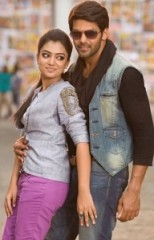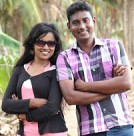PHOTOS & STILLS - GALLERY

RAJA RANI AND THE CINEMATIC COUPLES THERAPY
Tamil cinema has always encompassed romance in films of any other over-arching genre: comedy, action, etc., but lately there has been a pleasing influx of modernized love stories – those films that focus on the relationship and the people in them, and not all the external factors that normally pull them apart in the entertainers we see every week. Gone are the days when most consider the typical fall-in-love & solve-the-conflict-quickly stories to be portrayals of true love. As mature adults will tell you, it’s never as simple as falling for someone you set eyes on and then riding off into the sunset right after. Relationships take work; no one is perfectly packaged for another person such that when they meet they are instantly equipped to build a long-lasting bond devoid of any disagreements or struggles. That’s why it’s refreshing to see debut directors like Atlee giving us modern love stories that tell it like it is.
Raja Rani is every bit a Hollywood-esque romantic comedy - not because the characters wear the latest in Western fashion, but because the film discusses how people work to make a relationship succeed. Without a common problem like rowdies kidnapping the girl or a cheating boyfriend, Raja Rani talks about the conflicts more commonly faced by people who are in relationships themselves today. Like in customary Tamil films there is some parental influence forcing relationships together/apart, but the underlying conflict of the film is entirely universal: It’s about how 2 individuals develop true appreciation & affection for each other despite all odds, and that forms the basis of a love that helps them improve themselves and move on from past tragedies. Sathyaraj even claimed that he took up his role in the film because “the story of Raja Rani was so modern in thought”.
Atlee’s debut is significant of those risk-taking directors who dare to tell what many Tamil people might still consider ‘forward thinking’ stories. South Asian culture is one deeply rooted in arranged marriage and some generations are still resistant to the notion of dating. Seeing how young relationships are built nowadays on the big screen may yet be “foreign” to some, but luckily there are other emerging directors like Atlee – ex. Andrew Louis (Leelai), Jayendra (180) - bringing reality to audiences. But there are no better examples of directors who teach us about what it’s really like to fall, struggle & succeed in love than the masters Mani Rathnam & Gautham Menon.
Mani Rathnam dared to tell modern tales of imperfect relationships decades ago, and his most obvious examples would be Mouna Ragam (a film many have compared Raja Rani to) and Alaipayuthey. In Alaipayuthey parents want to keep Karthik & Shakthi apart, and on the contrary, in Mouna Ragam, family pressure forces Divya & Chandrakumar together. But both films are ultimately about how couples must learn to mould their lives together and how modern-day relationships take sacrifice and a willingness to accept those you love with all their flaws in order to last. What Mani Rathnam did and was perhaps considered “arthouse” Gautham Menon came along and did with greater commercial air. In all of Gautham’s films the people in love control the romantic plots; rarely do we see caste/religion posing a problem, but instead lovers ruin their own relationships through deceit (ie. Minnale) or there is hesitance to build relationships that are not conducive to certain careers (ie. Kaaka Kaaka, Varanam Ayiram). Nee Thaane En Ponvasantham was the exact definition of an independent romance, where a couple’s own inabilities to deal with their jealousy & neediness kept them apart. It could be said that the exception to his portrayal of love is Vinnaithandi Varuvayaa, but Gautham does pose the question: if Jessie & Karthik’s relationship was stronger and she was surer of herself could they have lived happily ever after despite her father’s resistance? Although the conflict of a disapproving parent is not really in line with a Hollywood romance, his VTV characters were exactly accurate of common relationship strains South Asian youth face today.
Tamil films like Raja Rani that are willing to discuss relationships as they are really happening amongst today’s dating and newly-wedding youth unfortunately don’t come around often enough. But the hopes of appreciating cinephiles are renewed when directors like Atlee are willing to tell tales that speak more to everyday life – when the doors to forward thinking are pushed just a bit wider, and room for more realistic love in Kollywood becomes available.
Behindwoods is not responsible for the views of columnists.
FACEBOOK COMMENTS
OTHER LATEST COLUMNS
DILANI RABINDRAN'S OTHER COLUMNS
- The Rahmaniac Syllabus
- Do you know who Rajinikanth is?
- Ajith - Making Bad look so Good
- Behindwoods at TIFF - Days 8 -11
- Behindwoods at TIFF – Days 5 to 7
- Behindwoods at TIFF – Days 1 – 4
- Will he or won't he - Vijay and the guessing game
- "A Gun & A Ring" and a Director to Watch For
- Thala - Using his status to lead !
- Rapid Fire with Vidyu Raman
- "Funny Girl" – An Interview with Vidyu Raman
- The Man + The Maker Part 2
- The Man & The Maker (Part 1)
- "Festivals of Film &Globalization"
- "Using Film for Societal Change"
- 15 Years of Jeans
- "How the South Shapes Bollywood"
- "A Marriage of Film and TV"
- Women in Real and Reel Life
- Hitting the Jackpot Twice
- VISHWAROOPAM: A Lesson in Crisis Communications
- "Education Through the Silver Screen"
- From Maddy to Gautham - The Valentine's Day Spread
- Vishwaroopam: A first hand account from across Atlantic!
RELATED LINKS
- The one common factor in many recent superhits
- Meet Mosakkutty Team
- Top Albums and Songs 2013 - Return of Rahman and Rise of Imman
- 4. Raja Rani | TOP 5 MOVIES AT CHENNAI BOX OFFICE IN 2013 - Slideshow
- Raja Rani 100th day celebrations
- 9. Raja Rani | TOP 25 MOVIES OF 2013 - Slideshow
- Think Music Santhosh Kumar
- 1. Nayanthara | Top 20 Actresses in Tamil - Slideshow
- 12. Nazriya Nazim | Top 20 Actresses in Tamil - Slideshow
- 9. Arya | Top 20 Actors in Tamil - Slideshow
- 17. Jai | Top 20 Actors in Tamil - Slideshow
- V4 Awards
- 3. Raja Rani | TOP 25 ALBUMS OF 2013 - Slideshow
- Repeattu
- Thirumanam Ennum Nikkah Music Review











